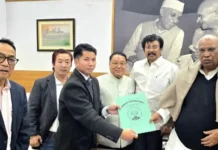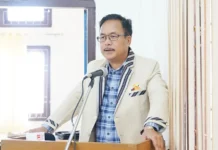[ Tongam Rina ]
At a cost of Rs 10,000 crore to connect Arunachal, the Trans-Arunachal Highway (TAH), which started in 2008 under the UPA, is the most ambitious road project undertaken by any central government.
In 2013, the TAH became part of the North East Special Accelerated Road Development Programme. It was special, but it has obviously not been accelerated, some due to the funding pattern of the Centre, but mostly because of local issues.
As it happens, the proposed 2,400 kilometres long construction did not take off on time because of slow and faulty land acquisition process and other administrative issues.
When construction started in some portions, environmental norms were violated, and these violations have altogether been ignored by the citizens, the government department, and the construction agencies. The end result has been multiple deaths and injuries, and disruption of road communication because of construction-induced landslides.
All these are obviously ignored by the people deprived of road networks. One has to pay a price for the development of the state. Well, as long as you and I are not paying.
But disregard of environment is not the only problem. It appears that, going by the slow progress, wherever construction has started, the construction agencies seem to have taken on more than they can actually deliver. The fault, however, is not entirely of the construction agencies. The local government agencies which assist in ground clearance have been unable to do their work, forcing an agency to withdraw.
Potin Pangin Highway Pvt Ltd (PPHL) – the construction agency for the Potin-Pangin stretch of the TAH – withdrew from the project, citing various obstacles. The Hyderabad-based company had signed an engineering, procurement and construction contract with Naharlagun-based TK Engineering Consortium Pvt Ltd in September 2014 to construct the Potin-Pangin stretch of the TAH via Yachuli, Ziro, Daporijo and Aalo.
According to the agency, the state government could not ensure right of the way (RoW) on time, as per the concession agreement, because of compensation issues, removal of encumbrances, and shifting of public utilities. The PPHL also alleged that, without even handing over 80% of the RoW, the state government forced it to maintain the road and bridges, making the firm incur huge expenditure.
The embarrassment was double for the government because of the failure of its own agencies, as the local administration did not do its job and the government dumped all its responsibilities on a construction agency, forcing it to flee.
Perhaps there is an inside story to all of this, but the fact remains that the TAH has been controversial from the beginning.
The latest is the arrest of three people, including former DC of Lower Subansiri Kemo Lollen and high-profile businessman Likha Maj, pertaining to disbursement of compensation for the Joram-Koloriang portion of the TAH. The bigger scandal is the Potin-Bopi stretch, where hundreds have been denied their rightful amount, forcing many to give up the compensation amount.
If the Special Investigation Cell looking into the TAH scam is as persistent as it has been with the Joram-Koloriang road, it is just a matter of time before some more people land up in jail for their role in the Potin-Bopi TAH scam.
It remains to be seen what shape the investigation takes, even as Chief Minister Pema Khandu has said that no one will be spared.
Amidst all the controversy, one can only hope that the TAH will become a reality.
The state needs roads, but at the same time it is unfair to expect that citizens should forego their land and property for free to make way for roads. Monetary compensation or land in lieu of land should be made available to the people without any constraint whatsoever. In Arunachal, many prime locations, especially in the border areas, have been taken away by central government agencies, more so the Army, for free. Monetary compensation for these lands started only in the last few years, thanks to the insistence of the late chief minister Dorjee Khandu.
On the other hand, these days it appears that projects have landed up only where powerful members of the communities, mostly landed businesspersons, politicians and tribal government employees own land. The proposed roads for some reason pass through rich people’s orange or apple orchards. A mere coincidence perhaps?



